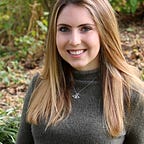Immigrant Business Spotlight: Dafero
Originally written for the LSSNCA Live Boldly blog.
Safa is a 26-year old refugee from Syria. She has five children under the age of 10, and has a third grade education. She was a hairdresser in Syria before she left, and her husband was a carpenter who had been injured in a work accident, so her entire family relied on her for financial support. Every weekend, she was picked up from her Baltimore home and driven to a commercial kitchen to prepare dates that would be used as ingredients for America’s first no-sugar-added date spread.
The product is sold under the name Dafero, and LSSNCA spoke to Lina Zdruli, the company’s founder, about the company’s dual mission of social good and promoting healthy foods.
Lina says the inspiration for the company came to her two years ago, and arose out of a personal health need. At a doctor’s direction, she was on a diet that prevented her from eating processed sugars. Her sweet tooth went unsatisfied, that is, until she found the date spread that would eventually become Dafero. She quickly realized that while her homemade date spread was incredibly popular among her friends and coworkers, but there was no way to purchase a sugar-free, preservative-free date spread in the U.S.
That is when she decided to start producing it and selling it at a larger scale. Having experience with the issues facing refugees living in the U.S. through her masters degree and work at the World Bank, she saw Dafero as the perfect opportunity to directly employee refugees like Safa.
Through Lina’s work with Safa, she gained first hand knowledge of some of the challenges and the benefits of employing refugees. This knowledge led her to develop a life skills course through the Kura Foundation, which offers free unlimited courses accessible by smartphone or any digital device, including a computer or an iPad. The content for these courses came directly from Lina’s interaction with refugee women and her ability to see the kinds of knowledge gaps they had.
For example, the financial literacy course came from a conversation Lina had with Safa about her first paycheck. When Lina asked for Safa’s bank details, Safa asked to be paid in cash. When Lina explained that it wasn’t safe to ride public transportation carrying large amounts of cash, Safa asked Lina to send her paychecks to her husband’s account. Lina then explained why it is important for women to have their own bank accounts, and walked Safa through the difference between a checking and savings account.
Lina also found that the women she worked with had other questions for her that she didn’t feel she was the best person to answer. That is how courses on everything from women’s rights, early childhood development, and sexual health became part of the Life Skills offerings.
Despite some of the logistical challenges of employing refugees, Lina also found that the women she worked with were incredibly eager to learn and dedicated to their work. She appreciated that refugee women from the Middle East were very familiar with dates, and were therefore able to help out with Dafero’s research and development by making suggestions about which equipment to use and how to improve the manufacturing process.
Unfortunately, Lina faced numerous other challenges with Dafero’s direct employment model, including having difficulty finding enough refugees in the DC area to staff the kitchen. COVID-19 exacerbated these challenges by shutting down the commercial kitchen that the women had been using to make the spread. When the schools were closed because of the pandemic, all of the refugee women’s children had to stay at home, which would have made it difficult for the women to leave the home for work.
Though Lina has had to relocate the production process outside of DC, proceeds from Dafero sales continue to fund the expansion of Life Skills course offerings and their translation in dozens of languages, supporting the courses’ global impact. All of the courses are physician or expert approved and used with open source material so that they can be distributed widely, free of cost. The courses are offered in multiple languages, including French, German, Italian, Polish, Spanish, Portuguese, Hausa, and Arabic. They are also currently being translated to Albanian.
For a full list of courses, visit the Kura Foundation website. To support the Kura Foundation by purchasing Dafero, buy it on Amazon, Dafero’s website, or Made in DC stores.
For more information on how to hire LSSNCA refugee and immigrant clients visit our website and fill out our employment inquiry form. If you are a refugee, SIV holder, asylee, or protected status immigrant living in Maryland or Virginia and are within 5 years of arrival/status provision and you need help finding employment, check out LSSNCA’s workforce development program.
